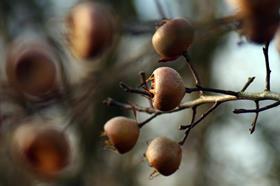
The long-forgotten medlar fruit is returning to Norfolk, with local grower Jane Stewart hoping to make East Anglia central to its revival in the UK.
Eastgate Larder – the only Norfolk producer to use medlars across its entire range of jellies and fruit cheeses – began growing the crop two years ago on its six-acre farm near Horsford, the Eastern Daily Press (EDP) reported.
Stewart, the company’s owner, completed her first harvest in November last year and is confident she can spark a comeback for the fruit, which is small, reddish-brown and looks like a cross between an apple and a rosehip. Her orchards grow eight varieties of medlar, including Dutch Monstress and Flanders Giant.
The fruit, which is harvested in November, has been cultivated since Roman times. It is thought to have been introduced to Greece around 700 BC and to Rome about 200 BC but has not been widely eaten in the UK since the 19th century.
“There is huge potential in this fruit and few people are taking advantage of it,” Stewart told the EDP.“I want to see how many possibilities there are with the medlar. We need to be creative and innovative with the fruit we grow here.”
She added: “I want to see Norfolk leading the revival of this fruit.”
Medlars, which are indigenous to southeast Europe and southwest Asia, are related to the apple family. Since they grow well in dry conditions, Norfolk – one of the UK’s driest counties – is well-suited to their production.
Picked when hard and green, medlars are not edible until they have become half rotten or ‘bletted’, when they turn soft and brown.
Ringden Farm in East Sussex is another leading producer of the fruit, growing the Nottingham Gold and Flanders Giant medlar varieties in addition to its core business in apples and pears.



